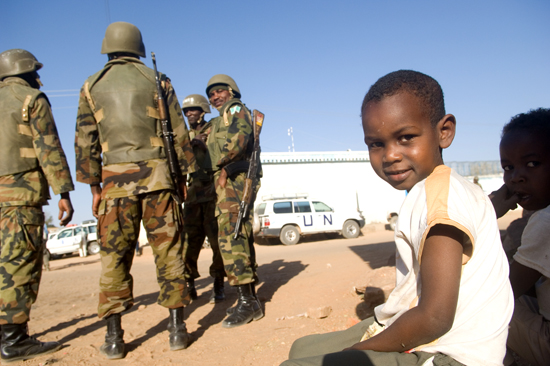

Reviews of Recent Independent, Foreign, & Documentary Films in Theaters and DVD/Home Video
Written & Directed by: Theodore Braun. Produced by: Cathy Schulman, Don Cheadle & Mark Jonathan Harris. Director of Photography: Kirsten Johnson. Edited by: Edgar Burcksen & Leonard Feinstein. Music by: Graeme Revell. Released by: Warner Independent Pictures/Participant Productions. Language: English, with English subtitles for Arabic & African languages. USA. 99 min. Rated PG. Darfur Now, a noble effort to individualize a human disaster in Africa, focuses on the experiences of six people affected by the violence to take action. While it has frequent insights, the repetitive images and stories disjointedly undercut its intentions. Three of the individuals are inside Darfur. Through Sheik Ahmed Mohammed Abakar, we get brief clues to the complex tribal issues that are otherwise characterized in the media as northern Muslims vs. Christian or animist southerners. At a displaced persons camp, he has taken on the thankless job of acclimatizing new, traumatized arrivals and negotiating between these frustrated, stressed-out refugees and the white-run aid agencies. The inclusion of the story of Hejewa Adam, woman warrior, is to the film’s credit but is also the most problematical in terms of the usual message about the crisis. As a victim of horrific attacks by the Janjaweed militias against her family and village, her first-person accounts of savagery are tragic. But with the filmmakers’ rare access to the rebels of the Sudanese Liberation Army, her military training and combat against the government forces reduce the vicious civil war to a matter of revenge. The Sudanese ambassador at the United Nations, through his defense of clearing villages to remove the rebel threat, sounds a lot like how the Nazis, as well as various Central and South American governments, said they had to eliminate civilian populations in order to remove partisan resistance. Ecuadorian Pablo Recalde heads the local World Food Program, representing the point of view of the idealistic relief agencies on the ground. He directs a truck convoy’s nerve-racking and suspenseful food run into West Darfur to feed millions of starving people. The high death rate on such deliveries and among humanitarian workers has limited outside assistance. The other three profiled personalize how the world is responding to the crisis. Luis Moreno-Ocampo, prosecutor of the International Criminal Court, came to The Hague after successfully prosecuting the deposed military dictators in his home country of Argentina. The camera follows his methodical effort to gather and evaluate evidence of genocidal culpability against specific Sudanese officials and Janjaweed leaders. Student Adam Sterling starts organizing at UCLA against corporations doing business in Sudan. As he expands his lobbying to the California legislature and governor, he gets a quick education in citizen politics from all sides, including a condescending warning from the NAACP’s lobbyist about a white guy getting involved in a “people of color issue.” Much of the film follows his learning curve, with increasing suspense, of whether he will succeed in getting a disinvestment bill passed and signed. Unfortunately, no economist is interviewed as to what the actual financial impact on Sudan of such disinvestment would be. Producer Don Cheadle is fully aware of the ironies involved in using his celebrity and experiences as an actor Oscar nominated for a film about another genocide, Hotel Rwanda, to gain both attention for this cause and access to decision makers. He has teamed with human rights activist John Prendergast to write and publicize the book Not on Our Watch: The Mission to End Genocide in Darfur and Beyond. In addition, he has personally shot footage of a displaced persons camp in Darfur, which he visited with George Clooney, and the film includes their improbable trips to China and Egypt, Sudan’s main trading partners, as they try to use their star status to lobby on a global scale on their own.
All this do-goodism should be inspiring, but Theodore Braun’s direction rambles within each portrait, turning nice guys trying to do the right thing
into an overlong chore. However, Annie Sundberg and Ricki Stern’s recent documentary The Devil Came on Horseback provides a more contextual
and emotional primer on the situation in Darfur.
Nora Lee Mandel
|